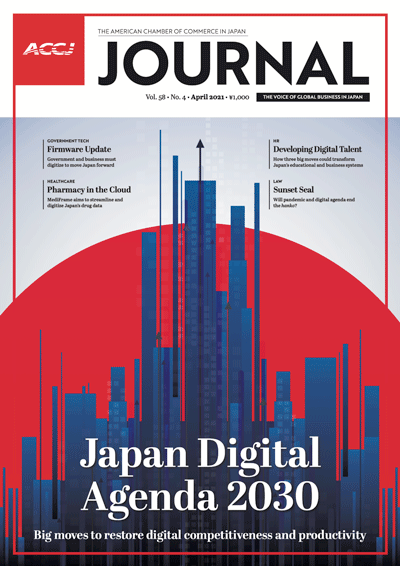Hitting the Ball out of the Park
Women in the business of sports
By Andy Hughes
With recent examples of women achieving high-profile positions in Major League Baseball (MLB), notably Kim Ng as general manager of the Miami Marlins and Alyssa Nakken as a full-time assistant coach with the San Francisco Giants, there is hope that more women will have the opportunity to take on leadership roles in sports that have traditionally been dominated by men.
On February 24, the American Chamber of Commerce (ACCJ) Women in Business Committee, together with the Olympics and Sports Business Committee, hosted a candid conversation with Sami Kawakami, Jean Afterman, and Raquel Ferreira, three of the highest-ranking women in the MLB and trailblazers in their own right. Kawakami is managing director of MLB Japan, Afterman is senior vice president and assistant manager of the New York Yankees, and Ferreira is executive vice president and assistant general manager of the Boston Red Sox.
During the discussion, they addressed the advancement of gender parity in the business of sports and shared how they broke through and made their voices heard.
Perception Is Key
Not so long ago, having women in leadership roles in the industry was almost unheard of. In such a male-dominated business, how do women push aside the obstacles and consolidate themselves as equals, judged solely on their ability to do their jobs rather than on their gender?
“I think the biggest barrier is that there are still a lot of people who have gender stereotypes, or have the perception that men are superior to women—especially in the baseball industry in Asia,” Kawakami said. “However, I have seen some progress over this past seven or eight years. When I first started to work in baseball, about 17 years ago, there were no women in either the front-office side or game-operations side of baseball in Asia, as far as I know—except for the one female delegation in China. All other women I met were either secretaries for a male executive or in an office administration role.”
“You need a support system around you, with people who believe in you, because not everyone will. You have to believe in yourself.”
What helped her get over the barrier, Ferreira said, was having a support system in place at the Red Sox. “Afterman and I have both spoken on the fact that our two organizations, the Red Sox and the Yankees, are the only two in the league that have had two female assistant general managers. They provided that support system and believed in us. You need a support system around you, with people who believe in you, because not everyone will. You have to believe in yourself. You have to surround yourself with people whose opinions you trust.”
Afterman explained: “It’s still a man’s world in the United States. You must be bigger, better, faster, stronger—to do the same job as a man—to be paid 72 cents for every dollar a man gets paid. You still have to have that something extra, and you have to break through that brick wall and just kick down the door and do the work.”
Kawakami recalled the event that was a turning point in her rise to managing director of MLB Japan.
“In 2006, I was assigned to work for some Asian national teams for the first World Baseball Classic as a team coordinator. However, one of the teams was not happy about working with me, because I am a woman, and maybe in part because I am Japanese,” she explained. “I decided to arrange a private meeting with the head of the delegation and address all the issues. I made it clear to him that I was just trying to do my job. It doesn’t make any difference whether I’m a man or a woman and Japanese or not. Since then, everyone’s attitude towards me changed. I think trying to change people’s perception is the key.”
Profile Raised
The number of women in baseball is growing, and with that comes increased visibility in the public eye. When the cameras capture Allysa Nakken in the dugout for the San Francisco Giants, it projects a message to the viewers—one that signifies to young girls that it is not impossible for a woman to be in that position. And why should it be?
But it’s not only the women in front of the camera who are making a difference for MLB teams. It’s also those behind the scenes, such as strength and conditioning coaches and development coordinators. “There are people working in baseball operations who might not be in visible baseball operations roles. They’re not scouts, they’re not coaches, they’re not managers, but they still add value and have impact on a team. Baseball doesn’t end between the white lines,” Ferreira said.
Although their numbers are growing, women still account for a minute percentage of MLB staff. With very few women working in the industry, they pride themselves on supporting each other and providing mentorship. It’s something Kawakami, Afterman, and Ferreira have carried with them growing up, as all three said they are especially thankful to their parents for being supportive and reminding them to identify and embrace their unique strengths as women.
“You need that support system. People aren’t islands. We’re very social creatures and nobody likes to feel alone, like they are the only one. We have all had the experience of walking into a meeting and you’re the only woman in the room. You have to support each other through those things. Otherwise, it can wear you down; it can really kind of destroy your spirit,” Afterman said.
Falling into a Role
Ferreira got her start at the Red Sox as an administrative assistant. It wasn’t her dream job, but she knew that she wanted to work in sports. Her parents taught her to pursue a career in a field that she would want to stick with and to work hard. Eventually, they said, that hard work would surely be noticed.
“Everybody defines success differently. Sometimes it means reaching a goal, accomplishing a task, or accomplishing what you set out to do in a particular year,” she said. “Whether it’s success in your minor league system or success with your major league team, I think everybody defines it differently. Every Major League team starts the season with one goal in mind, and that is to play as deep into October as you possibly can and, hopefully, to end up celebrating on your field.”
For Kawakami, it was sports-related injuries suffered when she was a teenager that helped guide her path. She grew up playing sports and had dreams of becoming a professional golfer or skier. But after discussing her future with her parents, she decided to pursue the games themselves as hobbies and concentrated on studying sports medicine abroad. If she couldn’t be a professional athlete, she was determined to support those who could.
“I know there are a lot of women who see that sports business is very male dominated, and they feel that they won’t be able to work in baseball unless they know a lot about it,” she said. “I believe the doors are open for anyone, regardless of gender, regardless of if they know or played baseball. I’m actually a good example. I love sports in general, respect our brand, and I like what I do. But I really cannot call myself a baseball person. I just want us to keep the doors open for anyone.”
“It’s what you bring to the game, and baseball is all about problem solving, and how women and men approach things differently … the more an organization embraces that and respects it, the better off they’re going to be.”
Afterman’s path was less direct. Even though she grew up an avid baseball fan, she fell into the role after being involved in a vastly different business.
Initially, she had worked in feature film production, in the 1980s. But when she became aware of the glass ceiling for women in that industry at the time, she opted to elevate her game, went to law school, and then moved into civil litigation. There, she met a colleague who took her to a baseball game while they were working on a case together in Tokyo. Given the high level of baseball in Japan, she was surprised that there weren’t more Japanese players on MLB teams.
Then she found out why and, being a newly minted lawyer, she knew she had some work to do. She learned that there were rules written in 1967 that restricted Japanese players from moving to the MLB, and she made it her mission to open the doors and to bring more Japanese talent to the United States.
Stronger Together
Men and women bring different views and experiences, and it is to the advantage of any organization to combine these differences to create a sum that is greater than its parts—whether in sports or any industry. Kawakami, Afterman, and Ferreira have shown that, in the MLB, women can be looked at for ability, to be known not as a great female executive but simply as a great executive.
And if at first your voice isn’t heard, make it heard. “I always tell people, if somebody doesn’t give you a seat at the table, bring a folding chair,” said Ferreira.
“You don’t necessarily have to play baseball to add value to an [MLB] organization. You bring a different perspective. I didn’t play baseball. I didn’t even play softball,” she added. “But I grew up watching my brother, who was 14 months older than me, in Little League in high school. That fueled my love and passion for the game.
“It’s what you bring to the game, and baseball is all about problem solving, and how women and men approach things differently,” she added. “And I think that the more an organization embraces that and respects it, the better off they’re going to be.”
THE JOURNAL
Vol. 58 Issue 4
A flagship publication of The American Chamber of Commerce in Japan (ACCJ), The ACCJ Journal is a business magazine with a 58-year history.
Christopher Bryan Jones, Publisher & Editor





